C Introduction & Get Started | C Programming for Beginners - Class 6 PDF Download
What is C?
- C is a general-purpose programming language created by Dennis Ritchie at the Bell Laboratories in 1972.
- It is a very popular language, despite being old.
- C is strongly associated with UNIX, as it was developed to write the UNIX operating system.
Why Learn C?
- It is one of the most popular programming language in the world
- If you know C, you will have no problem to learn other popular programming languages such as Java, Python, C++, C#, etc, as the syntax is similar
- C is very fast, compared to other programming languages, like Java and Python
- C is very versatile; it can be used in both applications and technologies
Difference between C and C++
- C++ was developed as an extension of C, and both languages have almost the same syntax
- The main diffference between C and C++ is that C++ support classes and objects, while C does not
Get Started
- This tutorial will teach you the very basics of C.
- It is not necessary to have any prior programming experience.
Get Started With C
To start using C, you need two things:
- A text editor, like Notepad, to write C code
- A compiler, like GCC, to translate the C code into a language that the computer will understand
There are many text editors and compilers to choose from. In this tutorial, we will use an IDE (see below).
C Install IDE
- An IDE (Integrated Development Environment) is used to edit AND compile the code.
- Popular IDE's include Code::Blocks, Eclipse, and Visual Studio. These are all free, and they can be used to both edit and debug C code.
- Note: Web-based IDE's can work as well, but functionality is limited.
- We will use Code::Blocks in our tutorial, which we believe is a good place to start.
- You can find the latest version of Codeblocks at http://www.codeblocks.org/. Download the mingw-setup.exe file, which will install the text editor with a compiler.
C Quickstart
- Let's create our first C file.
- Open Codeblocks and go to File > New > Empty File.
- Write the following C code and save the file as myfirstprogram.c (File > Save File as):
myfirstprogram.c
#include <stdio.h>
int main() {
printf("Hello World!");
return 0;
}
Don't worry if you don't understand the code above - we will discuss it in detail in later chapters. For now, focus on how to run the code.
In Codeblocks, it should look like this:

Then, go to Build > Build and Run to run (execute) the program. The result will look something to this:
Hello World!
Process returned 0 (0x0) execution time : 0.011 s
Press any key to continue.
Congratulations! You have now written and executed your first C program.
Learning C
When learning C, you can use our "Try it Yourself" tool, which shows both the code and the result. This will make it easier for you to understand every part as we move forward:
myfirstprogram.c
Code:
#include <stdio.h>
int main() {
printf("Hello World!");
return 0;
}
Result:
Hello World!
|
10 videos|13 docs|15 tests
|
FAQs on C Introduction & Get Started - C Programming for Beginners - Class 6
| 1. What is the purpose of the C programming language? |  |
| 2. How do I get started with C programming? |  |
| 3. Can I learn C programming without any prior programming experience? |  |
| 4. What are the advantages of learning C programming? |  |
| 5. Are there any resources available for practicing C programming? |  |

















